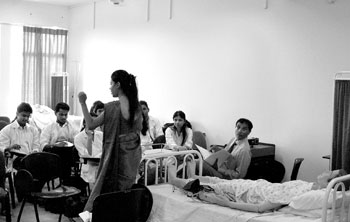What's all the fuss about private medical colleges?
It threatens to endanger the holy grail of all labour unions; that of medical professionals. Globally, doctors have held their privileged status very gently at first, very aggressively if needed, negotiating with governments to keep supply limited, so as to put a floor on prices.
Any attempts at an increase in supply would be disastrous to income levels of all medical professionals. Thus, rationally this is a simple fight about demand and supply.
You say rationally?
Medical care belong in the "special demand" category and unique amongst all economic goods. Due to emotions involved, people, including the poorest go over the top to spend away all their life savings to save the life of a loved one. That's human. It also brings out a perverse incentive structure for those who want to profit from that "special demand".
Do those opposing the "private" version have a point?
They have a very valid point. You need to understand the current system a bit better though. For all her failings, Sri Lanka's current system has produced high quality medical practitioners, many who have gone on to become respected specialists in their respective fields.
The reason for this advancement are twofold, first the fact that we graduate only a few doctors each year, who have limited resources at their disposal (in rural hospitals in particular) mean they get to treat a vast number of patients in a relatively short period of time.
This has the advantage of exponentially increasing skill levels compared to most Western systems that are beholden to legal liabilities. Skill has translated into many of our "MBBS" holders having a free passport to continue higher studies to become specialists through the UK in particular, subject to conditions.
So what's any of this got to do with graduating from a private college?
It shouldn't; as long as the private college comes with some reputation. The self serving argument for existing practitioners is one of economics (increasing supply hurts current and prospective income). The rational and valid argument is around quality. Doctors who go through the existing local systems, for reasons outlined above have well established minimum capabilities. Quality assurance of these garden variety private outfits is another question altogether.
That's ludicrous, haven't we been there before when all "private" providers entered the market?
Yes we have and the fears were found to be misplaced. But remember, diagnosing and treating a patient is quite different to granting some random degree whose total economic output is to create reams of paper and make it go around faster (read: business degrees). Thus the standards set for other degrees should be very different to those set for medicine and engineering.
Are you saying medical degrees are harder than everything else?
No, engineering is by far the most difficult academically. But medicine requires a skill level to continue to perform repetitive activities with great precision. And that's why quality matters.
n So the government would have been on very strong ground if a reputable university was established?
Precisely! Had they partnered with a top Indian university or even a top Russian university, and then said you need to be among the "next three thousand" in line who couldn't get to medical school, the medical unions wouldn't have had a foot to stand on.
So why did they go down this dangerous path, knowing the consequences?
Perverse incentive structures. The answers to all dumb decisions lie with incentive structure incompatibility. Vested interests are obviously throwing a lot of money at this thing, as the demand for parents to make their children "Doctors" is insatiable and there's a truckload to be made.
Can you blame the parents, with doctors making so much money?
Doctors, as defined by those having a MBBS do not make as much money as people suspect. Specialists are a whole different story. But, it takes a lot more to become a specialist in a chosen field than to get the MBBS. In fact, during the first 20 years of their life, a good plumber or carpenter in Sri Lanka can make more money than a median doctor.
So are you saying becoming a doctor is useless?
First of all, when did becoming a doctor become a financial choice? I thought "care" trumps "rewards"? Perverse incentive structures at work again, I see? Parents are missing a bigger picture in demographic shifts in the country and more importantly technological advancements globally. Health care is the greatest burden on older western economies, and as such the unions which have prevented technology advancement in this sector will be brought to their knees by unwilling politicians. The single greatest force on planet earth (bond markets), will dictate downward pressure on health care, where wages account for 80% of total government spending. Thus, with a declining population and pressure on headline costs, the only place for wages to go is down.
So why do parents continue to obsess about making doctors out of their children?
Irrational reasons, including social status and general financial illiteracy across the broader population.
Are you saying more doctors are unwarranted?
No, we need as many as we can (the more we have the cheaper each visit becomes), but of the right type. Randomly increasing the supply won't fix the real policy problems we face. These problems include the lack of specialists in specific areas, and making the broader medical services industry professional. For instance, a recent news article carried research findings that Sri Lanka lacks a single geriatrics specialist. A policy on palliative care is non-existent while a world class national drug policy has been shredded. The status of nursing is more cursed than the Middle East peace process.
But this has nothing to do with private medical colleges?
On the surface it may not, but it goes to incentives. Why private education when all the critical questions above are unresolved?
Isn't that the government’s fault?
No. Surprisingly it's the intransigence on the part of the doctors' unions which have prevented a satisfactory outcome for most of the problems above. Their opposition to granting of degrees to nurses is a classic point. This crazy position has meant that we have continued to denigrate our women to quasi-slavery and prostitution in the Middle East, when economically and socially we would have substantially benefited along the lines of the Philippines.
So where to from here?
The quality of medical professionals is paramount. The only privatisation of health training should be done using a public-private partnership model where the Government invites high quality universities from say India, China and Russia to partner with the existing medical faculties in the country and double the output of doctors.
Are you saying we should allow the medical unions to continue to wreck havoc?
Not at all. Unions shall fall due to something else that is totally unrelated to private medical colleges. Their swansong shall come courtesy of that other little annoying policy which is doing the rounds: CEPA.
What's CEPA got to do with it?
The Government is not in a position to pick a fight with the doctors. All governments in the past who have done so, ended up losing office (Mrs B's 70's regime comes to mind immediately). Thus they will put the private bit on the backburner until they sign the deal with India (no choice here for us by the way). Once professional services are opened, it will allow for Indian practitioners to come and provide services, thus lowering cost. That will essentially be the end of the health unions.
 |
| File photo shows medical students at a lecture |
How are you so sure?
The theoretical underpinnings come from a model known as the Nash-Harsanyi-Selten (NHS) model of multilateral bargaining. This model is one of the analytical marvels in the history of analytical science, and indeed of all science. Former President Richard Nixon summed up its essence potently; when you get them by the [unprintable] their hearts and minds will follow.
So you think the government is busy getting their head around this?
The biggest government policy action over the last two weeks was a "people's representative" giving a fascinating interpretation on the difference between slaughtering stolen cattle and those destined for consumption. Something tells me that the NHS model of multilateral bargaining is perhaps a bit much. That India would have perfected the NHS by now is a forgone conclusion.
(Kajanga is an Investment Specialist, based in Sydney Australia. You can write to him at kajangak@gmail.com)
|



